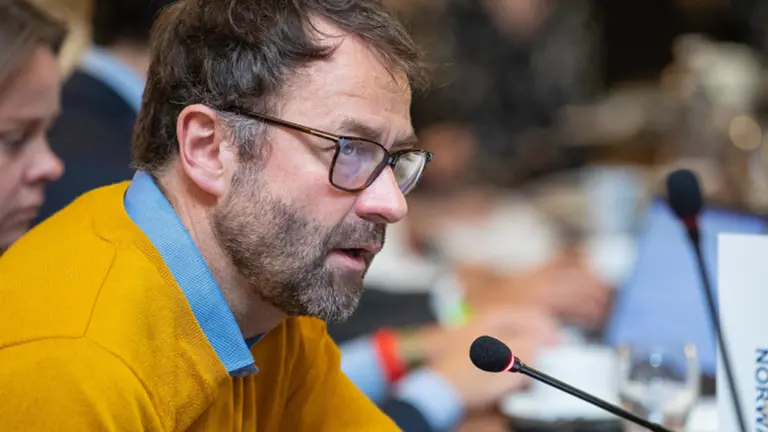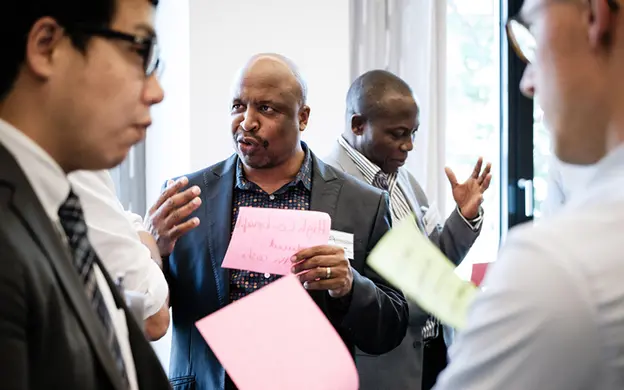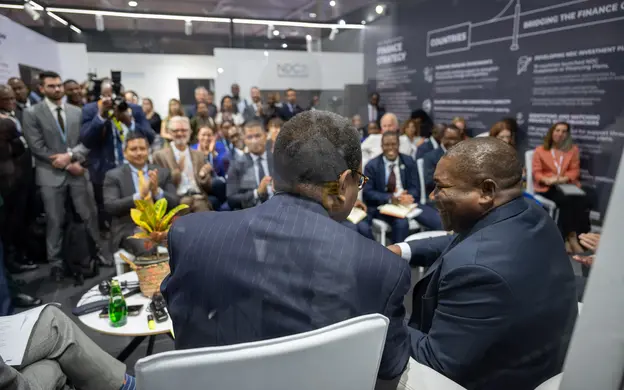
Glossary & FAQ
- What is the NDC Partnership?
-
The NDC Partnership is a global coalition, bringing together 250 members, including more than 130 countries, developed and developing, and more than 110 institutions to deliver on ambitious, transformational climate action that helps achieve the Paris Agreement and drive sustainable development.
Governments identify their NDC implementation priorities and the type of support that is needed to translate them into actionable policies and programs. Based on these requests, the membership offers a tailored package of expertise, technical assistance, and funding. This collaborative response provides developing countries with efficient access to a wide range of resources to adapt to and mitigate climate change and foster more equitable and sustainable development.
- What is the history of the NDC Partnership?
-
In 2015, the world endorsed the Paris Agreement and the 2030 Agenda for Sustainable Development. These historic accords presented countries with an unprecedented opportunity to align climate and sustainable development agendas to spur economic growth and improve the livelihoods of all people. To signal their commitments to the Paris Agreement, nations submit their Nationally Determined Contributions (NDCs)—each country's strategy to cut its own greenhouse gas emissions and build resiliency against the negative effects of a changing climate—on a cycle every five years.
Launched in 2016 at COP22 in Marrakesh, the NDC Partnership was founded on the idea that technical assistance, expertise, and financing for climate action were not being deployed effectively or in a coordinated way to maximize efforts towards achieving the goals of the Paris Agreement, and that greater support was urgently needed. In response, the NDC Partnership was established to facilitate collaboration between country governments, international institutions, non-state actors, and other partners to provide timely support for accelerated climate action.
The Partnership has been active for five years and is now looking ahead to build on our early success at driving more ambitious action on climate change and sustainable development. Designed to coincide with the five-year Paris Agreement cycle, the NDC Partnership will continue to support countries through the implementation of their newly revised NDCs submitted in 2020-2021, through the Global Stocktake of 2023, and into the new cycle of NDC revision and enhancement that culminates in 2025. The Partnership aims to remain a major driver for successful implementation of both the Paris Agreement and the 2030 Agenda for Sustainable Development.
- What is a Nationally Determined Contribution (NDC)?
-
As articulated by the United Nations Framework Convention on Climate Change (UNFCCC): “Nationally determined contributions (NDCs) are at the heart of the Paris Agreement and the achievement of these long-term goals. NDCs embody efforts by each country to reduce national emissions and adapt to the impacts of climate change. The Paris Agreement (Article 4, paragraph 2) requires each Party to prepare, communicate and maintain successive nationally determined contributions (NDCs) that it intends to achieve. Parties shall pursue domestic mitigation measures, with the aim of achieving the objectives of such contributions.
Together, these climate actions determine whether the world achieves the long-term goals of the Paris Agreement and to reach global peaking of greenhouse gas (GHG) emissions as soon as possible and to undertake rapid reductions thereafter in accordance with best available science... NDCs are submitted every five years to the UNFCCC secretariat.”
- What is the governance structure of the NDC Partnership?
-
The Partnership is guided by an active Steering Committee comprised of Country Members (developed and developing nations) and Institutional Members and led by two countries that serve as Co-Chairs on a rotating basis.
Please see our Governance page to learn more.
- Is the NDC Partnership an independent initiative?
-
The NDC Partnership is a global coalition. The collective work of the Partnership is facilitated by a Secretariat, known as the Support Unit, which is led by a Global Director. The Support Unit is hosted by the United Nations Framework Convention on Climate Change (UNFCCC) and United Nations Office for Project Services (UNOPS) in Bonn and the World Resources Institute (WRI) in Washington, D.C. The host institutions provide operational services to the NDC Partnership, including, human resources (HR), grant and fund management, and procurement services. Additionally, they participate in the Steering Committee meetings in an ex-officio capacity.
- What is the operational structure of the NDC Partnership?
-
The Partnership’s work is facilitated by the NDC Partnership Support Unit, which is hosted by the United Nations Framework Convention on Climate Change (UNFCCC) and United Nations Office for Project Services (UNOPS) in Bonn, Germany and the World Resources Institute (WRI) in Washington, DC, USA. The Support Unit is the secretariat of the NDC Partnership and coordinates among the Membership. The Support Unit is comprised of four core teams: Country Engagement, Knowledge & Learning, Operations, Outreach & Governance.
Member Focal Points lead engagement with the Partnership. Focal Points are the senior representatives of a country or institution who assume responsibility for internal coordination to guide their country or institution's engagement with the Partnership. Country focal points represent ministries responsible for addressing climate change and development, typically the Ministry of Environment and the Ministry of Finance or Planning, or heads of agencies and organizations.
In-Country Facilitators are entities or individuals identified and approved by the country government, who serve as the NDC Partnership’s national-level interface, operating as a liaison between the country and the NDC Partnership and coordinating the implementation of the NDC Action Plan.
- How does a country, institution, or association join the NDC Partnership?
-
We welcome all countries that are committed to ambitious NDC implementation and long-term, climate-resilient, low-emission development and all institutions and non-state actors that meet our criteria to join the Partnership. To learn more about joining the Partnership as a member, please see our Membership Guidelines for details on eligibility and the application process. Kindly note that membership is free.
- What types of support does the NDC Partnership provide?
-
Governments identify their NDC implementation priorities and the type of support that is needed to translate them into actionable policies and programs. Based on these requests, Partnership members offer a tailored package of expertise, technical assistance, and funding. This collaborative response provides developing countries with efficient access to a wide range of resources to adapt to and mitigate climate change and foster more equitable and sustainable development. The Partnership facilitates country access to financial resources through ongoing, pipeline, or new projects and programs from its member network.
The Partnership also supports nations in achieving their climate goals by increasing access to knowledge resources, identifying trends, in-country needs and knowledge gaps, and building a peer community by convening knowledge exchanges for countries to share their experiences implementing their NDCs.
Our success is made possible by the impressive commitment of members. More than 90 developing countries are receiving support to implement and enhance their NDCs, and more than 210 implementing partners, both members and non-members, are providing support. This is a testament to the shared conviction that by working together, we can be more than the sum of our parts.
- Who is eligible for support from the NDC Partnership?
-
Developing Country Members are eligible for direct, tailored expertise, technical assistance, and funding through the collective response of our 250 members.
Glossary
Associate Members
NDC Partnership members that are non-state actors.
Co-Chairs
The leadership of the Partnership’s Steering Committee, represented by one developing and one developed country, who serve on a rotating basis for two-year terms.
Country Engagement Cycle
A cycle that illustrates the NDC Partnership’s strategy to support countries in creating an enabling national framework for NDC updates, coordination, and implementation.
Country Members
NDC Partnership country members. The Partnership welcomes all countries that are committed to ambitious NDC implementation and long-term, climate-resilient, low-emission development.
Development Partner (DP)
A country providing official financing administered with the promotion of the economic development and welfare of developing countries as an objective.
Focal Points (FPs)
Senior representatives of a country or institution who assume responsibility for internal coordination to guide their engagement in the Partnership. Country focal points represent ministries responsible for addressing climate change and development, typically the Ministry of Environment and the Ministry of Finance or Planning, or heads of agencies and organizations.
Gender-responsive approaches
Identifying and understanding gender gaps and implementing actions to overcome historical gender biases in policies, programs, consultations and financing.
Implementing Partner (IP)
Any partner (member or non-member) that provides support to country requests through the Partnership.
In-Country Facilitators
Entities or individuals identified and approved by the country government, who serve as the NDC Partnership’s national-level interface, operating as a liaison between the country and the NDC Partnership and coordinating the implementation of the NDC Action Plan.
Institutional Members
NDC Partnership members that are international institutions, including multilateral banks and bilateral development agencies, that are committed to ambitious NDC implementation. Note that Associate Members, for purposes outside of governance proceedings, may be referred to as Institutional Members.
Knowledge Nook (kNook)
The NDC Partnership’s knowledge management system. The kNook is accessible to all Partnership members, upon request. The data in kNook is based on official requests for support submitted to the Partnership by country members, including Request for Support Letters (RSLs) and Partnership Plans (PPs). In addition, where available, the kNook also captures details on Implementing Partner (IP) responses to country requests.
Knowledge Portal
The NDC Partnership’s online learning platform that helps countries to accelerate climate action by providing quick and easy access to data, tools, guidance, good practices, and funding opportunities from partners and other leading institutions.
Long Term Strategies (LTS)
As articulated by the United Nations Framework Convention on Climate Change (UNFCCC): “In accordance with Article 4, paragraph 19, of the Paris Agreement, all Parties should strive to formulate and communicate long-term low greenhouse gas emission development strategies, mindful of Article 2 taking into account their common but differentiated responsibilities and respective capabilities, in the light of different national circumstances.”
Nationally Determined Contributions (NDCs)
As articulated by the United Nations Framework Convention on Climate Change (UNFCCC): “Nationally determined contributions (NDCs) are at the heart of the Paris Agreement and the achievement of these long-term goals. NDCs embody efforts by each country to reduce national emissions and adapt to the impacts of climate change. The Paris Agreement (Article 4, paragraph 2) requires each Party to prepare, communicate and maintain successive nationally determined contributions (NDCs) that it intends to achieve. Parties shall pursue domestic mitigation measures, with the aim of achieving the objectives of such contributions.
Together, these climate actions determine whether the world achieves the long-term goals of the Paris Agreement and to reach global peaking of greenhouse gas (GHG) emissions as soon as possible and to undertake rapid reductions thereafter in accordance with best available science... NDCs are submitted every five years to the UNFCCC secretariat.”
NDC Action Plan
National government-owned plans outlining how a country will implement or enhance their NDC, supported by the Partnership. These instruments include, but are not limited to, Partnership Plans (PPs), Request for Support Letters (RSLs), Climate Action Enhancement Package (CAEP) support, and economic advisory support (EA). For more on these activities, see our Country Engagement Guide.
Official Development Assistance (ODA)
Government aid that promotes and specifically targets the economic development and welfare of developing countries, as defined by the Organisation for Economic Co-operation and Development (OECD) Development Assistance Committee (DAC).
Paris Agreement
As articulated by the UNFCC: “The Paris Agreement is a legally binding international treaty on climate change. It was adopted by 196 Parties at COP 21 in Paris, on 12 December 2015 and entered into force on 4 November 2016. Its goal is to limit global warming to well below 2, preferably to 1.5 degrees Celsius, compared to pre-industrial levels. To achieve this long-term temperature goal, countries aim to reach global peaking of greenhouse gas emissions as soon as possible to achieve a climate neutral world by mid-century.”
Partnership Plan (PP)
A Partnership Plan identifies national climate priorities and connects these to support from implementing and development partners. The Plans play a key role in facilitating cross-governmental planning and monitoring of climate activity and harmonizing the roll-out of mitigation and adaptation actions. The Partnership Plan outlines common objectives and outputs, set by the government to achieve country NDC goals. The Partnership Plan reflects priorities and may not necessarily encompass the whole of the NDC. The Plan also serves as a resource mobilization tool through the identification of gaps, for example in funding for bankable projects. The availability of development partner support to meet identified needs will depend on planning and funding cycles and partner priorities.
Project Information Note (PIN)
An NDC Partnership template used to provide potentially interested financial institutions with the necessary background to pursue a project. PINs promote priority projects from NDC Action Plans to attract financing from the Partnership’s members, partners, and beyond.
Request for Support Letter (RSL)
Specific requests to the Partnership, formulated and submitted by Focal Points from developing country members and shared by the Support Unit with all members.
Scoping
The first of the five stages of country engagement: a government-led participatory process to identify NDC-related needs across the different sectors. The scoping stage aims to assess country needs for NDC implementation and detail requirements for the NDC Partnership’s support. Any member of the NDC Partnership can volunteer for the role of scoping lead with the approval of the member recipient country. The scoping lead will organize consultations with the government and in-country stakeholders, including: to raise awareness around the NDC Partnership and its services to identify initial implementation activities and needs, to establish contacts with member country offices and embassies, and to identify key stakeholders. The scoping lead guides the country engagement work from the initial scoping stage to completion of the Partnership Plan. If no member organization expresses interest, the NDC Partnership Support Unit will act as scoping lead.
Scoping Lead
An entity who volunteers to lead the work from Stage 1 (pre-scoping calls) to Stage 3 (completion of the Partnership Plan). The scoping lead must be approved by the member country or if no member organization expresses interest, the NDC Partnership Support Unit will act as scoping lead.
Steering Committee
The Partnership is guided by a Steering Committee comprised of country members (developed and developing nations) and Institutional Members, and meetings are run by the two countries which serve as Co-Chairs.
Support Unit
The NDC Partnership’s Secretariat, hosted by the United Nations Framework Convention on Climate Change (UNFCCC) and United Nations Office for Project Services (UNOPS) in Bonn, Germany, and the World Resources Institute (WRI) in Washington DC, USA.
Whole-of-government
Policy approaches that effectively leverage a government’s full capacity, i.e. ministries, departments, or similar bodies directly or indirectly involved in climate change responses.
Whole-of-society
Policy approaches that include representatives from civil-society, academia, the private sector, various identity groups, or other groups at various stages of consultation or other processes.

